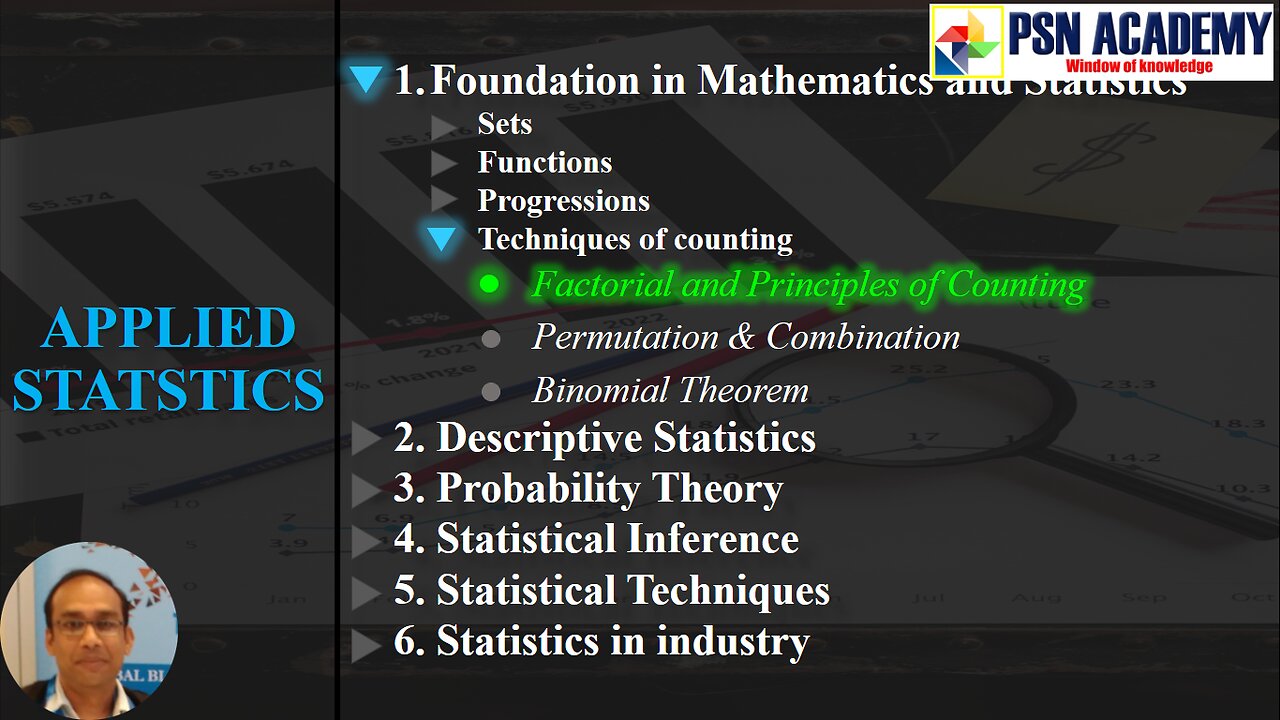Premium Only Content

1.1.4.1 Factorial and Techniques of Counting | Fundamental principles of addition and multiplication
In this video, you will get the idea of factorial and its notations. Also you get the logic of fundamental principles of addition and multiplication.
There are two fundamental principles of counting. These two principles solve the problems of counting.
According to Grinstead and Snell (2006) counting is defined as:
“Consider an experiment that takes place in several stages and is such that the number of outcomes m at the nth stage is independent of the outcomes of the previous stages. The number m may be different for different stages. We want to count the number of ways that the entire experiment can be carried out.”
Fundamental Principle of Multiplication (FPM)
--------------------------------------------------------------------------
Situation: Two or more jobs to be done sequentially.
When the first job can be done in 𝑚 distinct ways and the second job can be done in 𝑛 distinct ways, then both jobs can take place (one followed by other) in 𝑚×𝑛 distinct ways.
Fundamental Principle of Addition (FPA)
----------------------------------------------------------------
Situation: One of the two or more jobs to be done.
When the first job can be done in 𝑚 distinct ways and the second job can be done in 𝑛 distinct ways, then one of the two jobs can take place in 𝑚+𝑛 distinct ways.
-
 1:26
1:26
WildCreatures
14 days ago $0.90 earnedCow fearlessly grazes in crocodile-infested wetland
3.49K1 -
 29:54
29:54
DeVory Darkins
1 day ago $14.43 earnedHegseth drops explosive speech as Democrats painfully meltdown over Trump truth social post
53.4K65 -
 19:39
19:39
James Klüg
1 day agoAnti-Trump Protesters Threaten To Pepper Spray Me For Trying To Have Conversations
15.7K16 -
 34:54
34:54
MattMorseTV
13 hours ago $26.01 earned🔴Trump just FIRED 154,000 FEDERAL WORKERS. 🔴
72.4K88 -
 2:03:32
2:03:32
Side Scrollers Podcast
21 hours agoMASSIVE Netflix Boycott + The TRUTH About Jimmy Kimmel’s Return + BIG Side Scrollers NEWS
35.6K15 -
 15:05
15:05
GritsGG
1 day agoFlawless Duos Victory w/ Most Winning Duo in Warzone History!
32.5K2 -
 1:53:52
1:53:52
FreshandFit
17 hours agoShe Was In 3 Domestic Violence Cases? Happy Birthday Fresh!!!
161K57 -
 2:03:22
2:03:22
Inverted World Live
9 hours agoThe Aliens Are Underwater | Ep. 117
70.1K29 -
 2:20:24
2:20:24
Badlands Media
17 hours agoDevolution Power Hour Ep. 394: The Long Game, Media Traps, and Military Signals
97.7K30 -
 2:08:38
2:08:38
TimcastIRL
11 hours agoNetflix Shares TANK, Elon Says BOYCOTT After Writer MOCKS Charlie Kirk Assassination
252K194